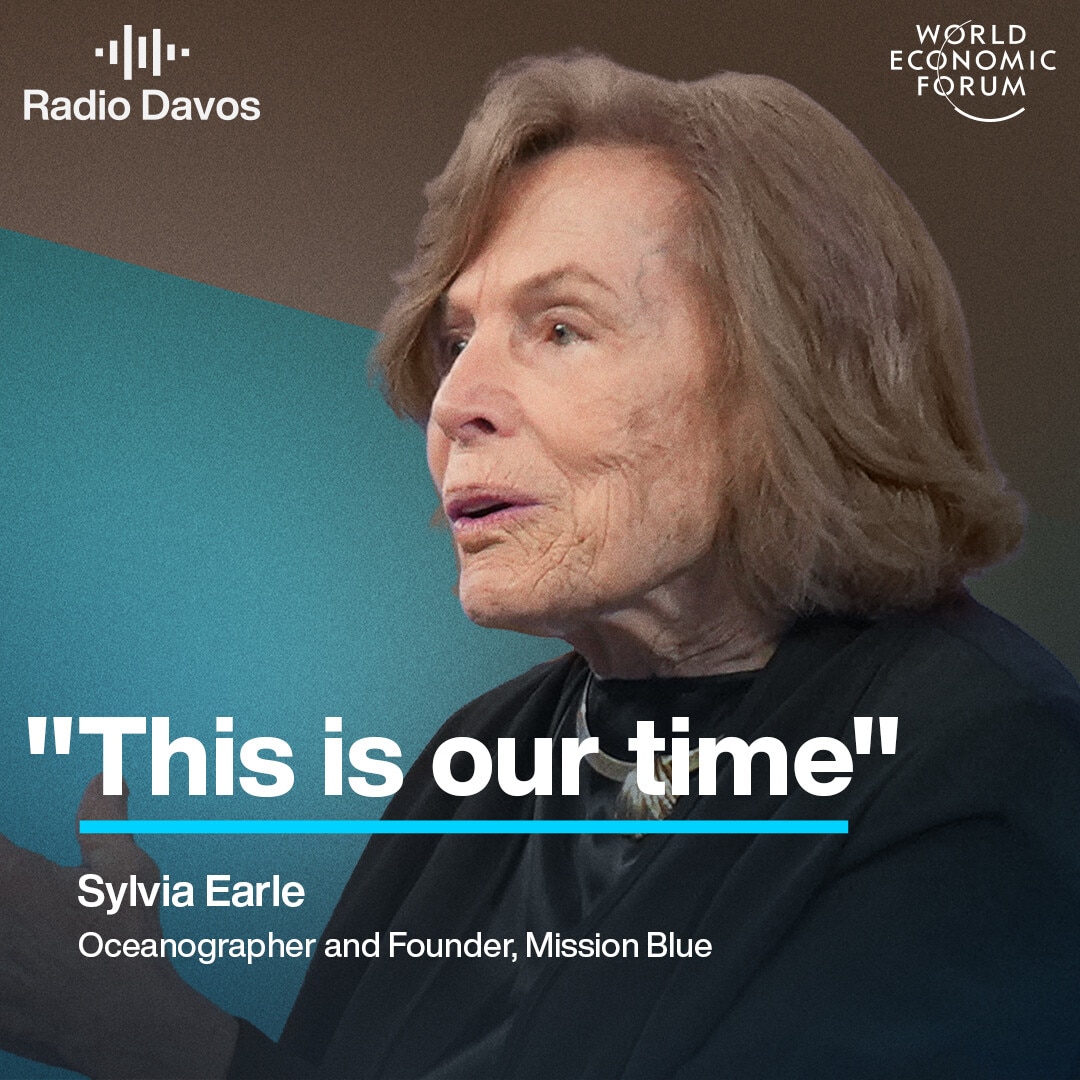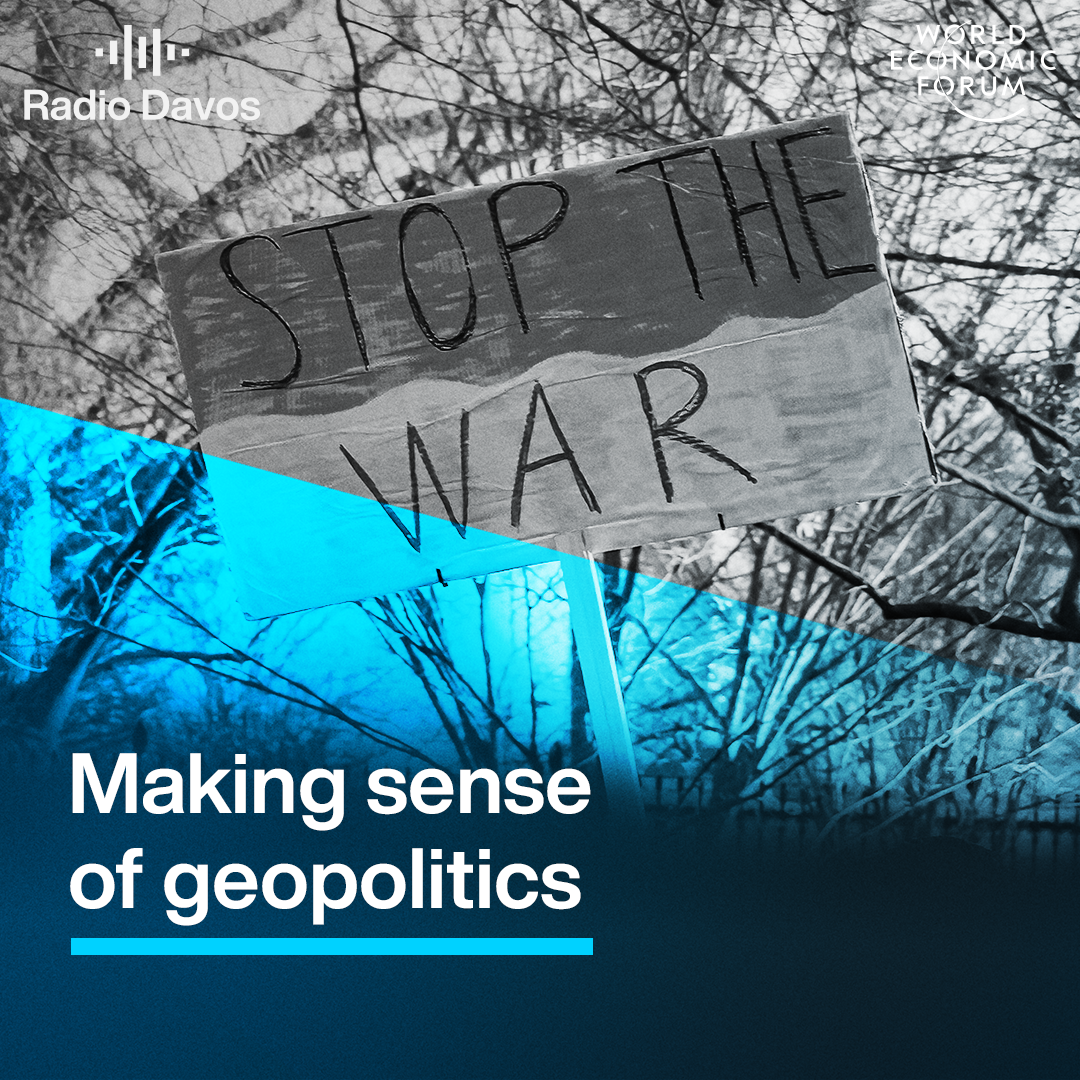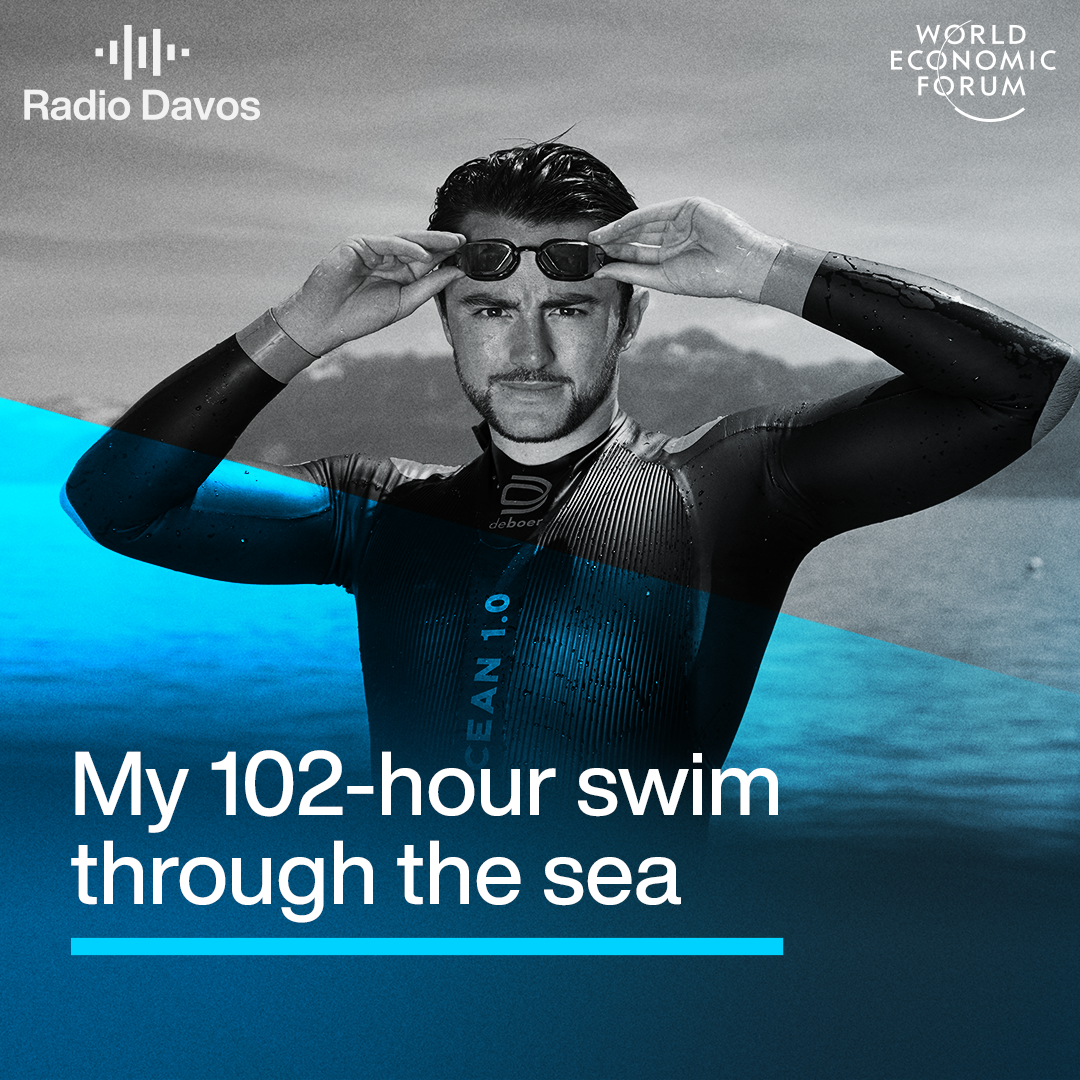This Is Not Financial Advice: navigating the jungle of online investing
ポッドキャスト・トランスクリプト
This transcript has been generated using speech recognition software and may contain errors. Please check its accuracy against the audio.
Chris Temple, filmmaker: It's the most common investment right now for Gen Z. You know, anyone under the age of 24, the most common thing that they are investing in is cryptocurrency.
Robin Pomeroy, host, Radio Davos: Welcome to Radio Davos, the podcast from the World Economic Forum that looks at the biggest challenges and how we might solve them.
This week: where do you invest your money, and whose advice do you take? We speak to the director of a movie that follows online influencers, including one who made - and lost - millions in crypto.
Clip from 'This Is Not Financial Advice': I literally took everything out of my bank account, sold all my stock, maxed out two credit cards and took out cash advances and threw it all into Dogecoin - recently rallied to be worth more than Kraft Foods and it has no product. I just became a millionaire by spending all my money on Dogecoin.
Robin Pomeroy: The movie This Is Not Financial Advice is a fascinating look into the real lives of people chasing the highs...
Clip from 'This Is Not Financial Advice': Dogecoin is a joke. His millions are not.
Robin Pomeroy: And hitting the lows...
Clip from 'This Is Not Financial Advice': I'm the brokest millionaire you know. If you guys knew how much money had in my bank account you'd laugh.
Robin Pomeroy: Of investing online.
The movie maker is taking his film into schools and colleges around the US to encourage awareness and spark discussion about financial literacy.
Chris Temple: Whoever's listening to this, sure, they may have this opportunity to get rich quick. Most people will lose.
Robin Pomeroy: And we hear words of wisdom from the World Economic Forum’s Centre for Financial and Monetary Systems.
Meagan Andrews, Lead, Capital Market Initiatives, World Economic Forum: Make sure that you're using multiple sources before you put your money into anything, and don't put it all into one thing.
Robin Pomeroy: Subscribe to Radio Davos wherever you get your podcasts, or visit wef.ch/podcasts where you will also find Meet the Leader and Agenda Dialogues.
I’m Robin Pomeroy at the World Economic Forum, and with this look at the world of online investing...
Clip from 'This Is Not Financial Advice': I would sell no later than tomorrow. I'm not xxxing selling.
Robin Pomeroy: This is Radio Davos.
Investing is no longer the reserve of the city boys on Wall Street, anyone with a few dollars to spare and a smart phone can put their cash into pretty much anything. And there's no shortage of advice online - which can be a good thing, but also has risks of its own.
On this episode, we’re talking to the director of a documentary that takes a close and personal look at the world of online investing and of finfluencers.
And before we start, here’s part of a teaser trailer for the movie called This Is not Financial Advice:
Clip from 'This Is Not Financial Advice': We live in a time where people have lost faith in institutions, that the system isn't fair to them.
Like 10% of people hold 70% of the stocks in the stock market.
You know, we don't know about that. We come with this dream, shake a tree and money is going to fall.
I can understand why somebody says, I'm going to do it my own way. And there are other people like me, and we're going to go against the rules.
I'm Kayla, also known as Girls Talk Stocks. I'm trying to be a voice of reason for people who want to enter this space. And now I feel like it's more volatile than I'd expected.
I just dropped 300,000. You lost $5,000 or 1,000, however much you invested. I lost millions.
And cut.
Robin Pomeroy: I'm joined from New York by a co-host, Meghan Andrews, who's Lead, Capital Market Initiatives at the World Economic Forum. Hi Meagan.
Meagan Andrews: Hi Robin. Thanks for having me.
Robin Pomeroy: Thanks for joining us. Tell us, what is the role of Lead, Capital Market Initiatives at the World Economic Forum.
Meagan Andrews: Very good question. So, essentially I lead a lot of our research around any capital market trends or something that we want to dive into. And increasingly, over the last few years, we've really turned our eye towards individual financial wellbeing as a really important topic for us to explore.
And so that's what we spent a lot of time doing over the last few years, looking at the rise of retail investors, looking at the importance of tools and services like financial advice for individuals, and a whole host of other things like financial education and literacy that are also really important.
Robin Pomeroy: You're talking about financial advice. The subject of this podcast will be 'this is not financial advice'. Tell us who our guest is on this podcast.
Meagan Andrews: Chris let me know how I do, but I'm really delighted to have Chris Temple join us today. So Chris is a film director and founder of Optimist, which is a non-profit studio based in Los Angeles in the US.
Now, Chris, your films have been released globally by Netflix, HBO, Hulu and PBS. You're best known for directing many films, including Living on $1, Salam Neighbor and Five Years North, and most recently, and importantly for today's episode, you directed a feature film titled This Is Not Financial Advice, which really explores the psychology of retail investing, social media, FOMO in the modern digital era.
How was that, Chris?
Chris Temple: You did great. Thank you.
Robin Pomeroy: Great to meet you, Chris. So you made this documentary, This Is Not Financial Advice. How do you describe the movie to people?
Chris Temple: I think the film is a roller coaster ride into the last few years of how technology is changing our relationship to money. So, you know, how are we seeing the rise of phone apps, zero commission trading, social media affecting all of us in our relationship to money and how we invest, save and get access to financial information.
Robin Pomeroy: I've seen the film. It's a lot of fun, we have to stress that, for anyone thinking, oh, should I watch a film about financial advice? Well, it's not financial advice.
It's a documentary, but it's definitely got well formed real-life characters. And the main character is a young man called - am I saying his name right? - Glauber Contessoto. And he's also known as the Dogecoin Millionaire. Tell us something about Glauber and who he is and why you decided to turn your camera on him.
Chris Temple: Yes. So, you know, the film is fun and entertaining because we wanted to provide an entry point for people to have this conversation and in many ways compete with the entertaining YouTube videos where people are getting their current financial advice and information.
So, you know, I spent the last three years interviewing financial experts, academics, psychologists, wealth advisors, to kind of synthesise all of this information into what we hope is a very engaging film. And the way we did it was instead of having, you know, talking heads explain stuff to you through the whole film, we focus on four individuals and their relationships to money.
So they all come from different walks of life, have different risk profiles, as all of us do. And then I hope, you know, each viewer can kind of connect to different parts of each one of their stories.
So the main one that we focus in on is someone who I met on Twitter. I saw a post that he put out saying he had maxed out his credit cards, he'd taken out cash advances, sold all his stocks, and put all of his life savings into Dogecoin, which is a cryptocurrency that was actually started as a joke to make fun of Bitcoin.
To me, I found this fascinating. We jumped on a call later that afternoon and then began filming the following day. Really just trying to answer the question of why was he making this kind of decision. And the answers we came to were actually much more complex than I imagined when I began. It would be easy to write him off as an idiot, but I think there's much more systemic factors at play that were driving Glauber to make this decision.
But, you know, to give you a bit of a spoiler for the film, you know, we watch him take this investment and ride it up to $1 million in Dogecoin.
Robin Pomeroy: That's from an investment I think of $80,000 he managed to scrape together, right?
Chris Temple: 180,000 that he put together and - his whole life savings, everything, borrowing from others. He rides it up to $1 million. You'd think, you know, 5x your return, he's going to sell, right? And take some gains on that. At least get his initial investment out.
No. For many reasons that we'll get into, Glauber holds on to this, investment, rides it up to 2 million, then 2 million to 3 million, still refusing to sell. And the next thing you know, the market begins to turn around, that happens in all markets, but especially in a very volatile market like the cryptocurrency markets, these can rise and fall in a single day. He loses $1 million in an hour on a Dogecoin price fluctuation.
But then at that point, a whole new set of psychological triggers come into play and he doesn't want to sell at 2 because it used to be 3. So, you know, I think we use this extreme example of Pro's situation - he calls himself Pro - of Pro's situation, to talk about and illuminate the factors that all of us will face as new investors in financial markets.
Robin Pomeroy: It's extraordinary. I mean, why did he get into it in the first place? I mean, I've heard of Dogecoin. It's been around quite a while now. Why did he pick that one? Do you know.
Chris Temple: Yeah. So, you know, a couple really interesting things started coming to light the more we filmed with him.
I mean, I think one, and in many ways his primary motivator for getting into this, was honestly frustration with the system of wealth inequality, with his lack of access to traditional financial markets.
So, you know, Pro is an undocumented immigrant here in the US. So he's had a lot of trouble getting and holding stable jobs. When he got to college, he was denied entry due to lack of papers. And I think there was just a significant frustration that, you know, in the US, and this is a global problem, but, you know, in the US, you know, 50% of Americans don't have $500 of savings at any given time. And I think this driving drumbeat of frustration was a number one factor.
Two, I think the social media elements and the community that was built around Dogecoin became a really, really big factor for him. So, you know, he started talking about this online, and he found a community of hundreds of thousands of other people who were encouraging him.
Robin Pomeroy: And of followers as well. He became a leading light for other investors.
Chris Temple: Yes. And I definitely want to get into that more too of then his role of amplifying other people to invest.
But, you know, I think he was a really lonely guy who lived in a studio apartment in Hollywood, 180ft², and he finally had people paying attention to him. And that feels really, really good and became very difficult for him to leave that community because it felt like a bit of a betrayal to sell the Dogecoin when his identity was so tied to this single financial asset.
Robin Pomeroy: You follow him in his home life. And he has a very, very modest, for someone who's worth $3 million at one point, he's deliberately living as frugally as he possibly can, because everything he's got is going into this investment.
Chris Temple: To bring you into his room for a moment, you know, it's this tiny thing. It's basically just a bed in a room here that he found on Craigslist for free. It used to be bunk beds because he had a roommate in this single room studio. And I think it's important because it's the psychological profile that he had, too, is a big part here where, you know, his risk taking mentality was to the extreme.
And it wasn't just from a financial standpoint. Everything that he did was to the extremes, whether it was living frugally or, you know, a funny part of the film is he gets really into celery juice because he reads online that celery juice is a way to be healthy, right? So every single day he drinks 48oz of homemade celery juice, which is double the amount that's recommended. But in his mind, as he says in the film, you know, if celery juice is good for you, then more must be better, right?
And I think that 'more must be better' mentality is something that not only has affected Pro, but I think is a cultural shift that we've seen affecting millions of young people, hundreds of millions of young people all over the world, especially who who want things now.
Robin Pomeroy: It's a story of the American dream, isn't it, in some ways. Because it surprised me. You know, you drop that bit of information halfway through, what you've already said, he's an undocumented immigrant from Brazil. He's there with his mother. Because up until that point, I, as not an American, I was thinking, oh, yeah, here you go, here's an American kid, you know, in his shorts and his beard, hanging out. But it's kind of in his case, he I mean, he's literally what the Americans call a dreamer. Right? Is that is that a dreamer?
Chris Temple: Yeah. Exactly. Yeah.
Robin Pomeroy: The idea that you can arrive with nothing and make your fortune, I don't think, you know, the founding fathers or whoever, you know, developed that that myth had in mind Dogecoin or this kind of thing. But but there is that element to this story, isn't there?
Chris Temple: Well, I think I think it's part of what makes it hard to not root for him during the movie. You know, when you hear from his. And why a great movie always has complex characters, right? And and I why I loved him, you know, you see his his mom, who's working as a house cleaner and has been here for, you know, 25 years, working really hard to raise her son and try to put him through college. And, yet he hasn't been able to find a legal pathway to citizenship here, even though he came as a four-year-old child.
I mean, we can do a whole other episode on America's broken immigration system, but I think it all contributes to that frustration that I think has fuelled a lot of the markets that we're seeing in financial behaviour, whether that's GameStop that we've seen talked about where people are trying to rally together to pump up certain stocks and stick it to the man, take down Wall Street. A lot of this lingo is fuelled psychologically but also then social media plays a really big role in amplifying that collectively around the internet.
Robin Pomeroy: It's such an interesting look at markets. I think the GameStop one's really interesting. But also going back to Dogecoin, in the film we see a very exciting moment for all the investors in Dogecoin, because Elon Musk has tweeted that he's a fan of it and he's about to go on a comedy show, Saturday Night Live. Correct me if I'm getting any of this wrong, and they've got the TV on and they've got the graph showing the price of Dogecoin and just him coming on, does it go up? But then when, in his opening monologue, he doesn't happen to mention Dogecoin, this is the guy that owns Tesla and SpaceX, he's got a lot going on, but the market doesn't like the fact he's not mentioned Dogecoin. It starts to dip.
And in a way, you have a laugh at it and you can sneer at it a bit. But in a way, this is sometimes how markets work. I've covered financial markets as a journalist, and markets, at least in very short term, do rise and fall even on, you know, a comment that wasn't quite what was expected from the central bank chief, for example. These tiny little things can influence that.
What did you make of this waiting for this speech on Saturday Night Live by Elon Musk. It was in a way bizarre, but in a way they were right. This would affect the price of this asset.
Chris Temple: The more bizarre, the more engaged people are getting.
You look at this applying outside of financial markets in the States right now to our own presidential election or whatever it may be. You know, the internet is fuelling the absurd, in the extreme. And, you know, I think Elon Musk is, you know, a great example of somebody who has that kind of power to shift markets, whether that's traditional markets or crypto markets.
But why the crypto markets in the current phenomenon, I think, is amplified is that, you know, crypto trading is 24/7 around the clock, any hour of any minute people can be in there. It's the most common investment right now for Gen Z. So you know, anyone under the age of 24, the most common thing that they are investing in is cryptocurrency.
And so, you know, part of what we wanted to do here with the film was to spark these conversations for young people to increase in a non-judgmental way through a film that can kind of be entertaining and an educational entry point to think about the role of financial advice online and people like Elon Musk, to think about the future of crypto trading and why it might be more speculative or dangerous.
And to, I think the most important one, third, is to think about your own relationship to money and your own psychological profile to risk, because so many of us never have that conversation with ourselves of what is my risk profile? What are my goals with money? And if you don't define that, then when you start seeing someone on the internet saying, hey, you can make $1 million in an hour on crypto, it might feel really tempting with FOMO, your fear of missing out, and the next thing you know, you've made a really bad financial decision.
So our hope is that this film can really help a lot of people. And it's helped me, honestly. Making this film was a big, has been a hugely educational process for me to come to terms of my own relationship with risk and FOMO.
Robin Pomeroy: Meagan, this is not financial advice. What is the World Economic Forum, when it's talking about personal finance, what what are you discovering? And do you have any words of advice for people who might be tempted to follow influencers on line?
Meagan Andrews: There are a number of things that we look at when we think about improving an individual's financial well-being state. And so, just to quickly define what that means, financial well-being means that an individual is able to meet current and ongoing financial needs, as well as feel secure in their financial future.
So to do that, there's a whole stack of tools, products and services that they need to be able to dip into to make the best financial decision for them. There are, of course, a number of limiting factors like financial education and financial literacy, which Chris, I hope we'll dive into soon. But we know that global financial literacy levels, for example, are about 35%, which is just too low. And we really need a revolution in how we think about financial education. And I think that's one thing that we'll dive into today, but that we're giving a lot of thought to.
But more fundamentally to this conversation, we've spent the last 6 to 9 months actually diving deep on financial advice specifically. And in fact, social media is a really big, important part of that because it's allowing people access to financial information.
Now, one big caveat I'm going to throw in right here, we make a distinction between financial information and financial advice. So financial information is a very kind of one to many way of distributing information like what you see on social media and financial influences or finfluences. And that is not necessarily regulated content. They're not necessarily credentialed individuals giving some of this information.
And that is very distinct from financial advice, which is provided by a regulated professional specific to you and your financial needs. And so that's really critical, it's one to many to very tailored to you.
And what we find financial advice is really can be such an important tool for people. Studies have shown, for example, here in the US, that a holistic approach to financial advice can save the average household about 7.5% of their annual income. And that's when you think about, you know, tax planning, when you think about financial planning, pension saving, whatever it might be, that holistic approach.
But, you know, something that has limited financial advice historically is a bit of a misconception around what it is, how expensive it is. People are also really intimidated. They don't know how to get started.
And so these access barriers is really hard to break down. And that's where social media has played a really important role. And we have to acknowledge some of those benefits because I think, Chris, we've dived into some of the challenges that we've seen in terms of how people deal with this risk, but they're also, our research shows that, you know, there are some people that game the market, but it's not the majority. People are there for the long term to try to save for long term financial goals, too.
And so social media gives them a way to access that sort of content, that information that they would not otherwise have access to. And that's a really powerful conduit.
So that's a few of the things we've been thinking about.
Chris Temple: You know, one of the other subjects in the film, is one of these people on TikTok and YouTube is providing financial information. Her name is Kayla. She goes by the handle Girls Talk Stocks. And for her, you know, she explains her story of you're getting beginning to do this work because she found the terms that were used in finance to be really exclusionary, the culture around it to be very difficult to get into if you were a young female or just wanted to learn more. And so she started putting out information on her own TikTok that were answering, you know, what could be perceived as simple, financial terms or simple elements like what is compound interest? Let's go into that and talk about this in case maybe someone didn't teach you.
And, you know, as you said, Meagan, you know, only a very small number, what you say, 35% of people have any form of financial education globally. In the U.S. it's a pitiful excuse for financial education at the high school level. And so I think she's meeting a really interesting need within the U.S of providing an outlet, for those to get information.
And again, I think how we talk about it in the film is the information that Kayla is providing, or the conversation that she's starting, is a spark, right? It's hey, have you thought about compound interest? Let me talk to you for two minutes in a TikTok video about this. Make it really digestible, easy to understand. Now, maybe you're going to be curious enough to dig deeper, or to take another step, or to watch another video.
And I think that's where social media can be really, really helpful is an onboarding ramp for people to get access to this sort of stuff. And I think it was for me where, you know, that's where, I was an economics major. I was never a filmmaker, yet I didn't know very simple things about how to invest or deal with my financial future. I didn't even know that I needed to invest my Roth IRA into a fund of some kind. I'd just been putting money in it and assuming it was going to...
Robin Pomeroy: That's a that's a pension fund, right?
Chris Temple: Exactly. It's equivalent of a retirement fund in the U.S. And, you know, and no one's teaching you that stuff until I started watching some of these videos online.
Robin Pomeroy: Kayla's very interesting and she seems very sceptical of Dogecoin. She's does some kind of sketch with the door. I can't remember what happens, but really, she's almost mocking the crypto bros in 1 or 2 of her videos. Is that right?
Chris Temple: Yeah, absolutely. And I think, you know, part of why she started doing the videos that she did is she felt, again, the culture of crypto and the, you know, she describes it as bro-ey, not welcoming to new community members, to be able to learn about finance. And I think it's not just crypto. I think, you know, obviously we've seen this culturally talked about on Wall Street for many, many years in other films like Wolf of Wall Street or, you know, other examples of that over the years. So I understand where she's coming from.
Meagan Andrews: And Chris, maybe to add, I think what's really interesting about Kayla is I think that the followers that she's accumulating, it's because of her kind of relatability and authenticity.
At one point in the film, I think she makes a call out for any women who are investing in the stock market to DM her. So I think that point around social media and what we've also found in our research, that relatability point is really connecting with people, particularly a growing, diverse population of investors. And changing demographics is one trend that we've looked at. And we know that the demographics, you know, we're becoming more diverse. There's more women, there's more people of colour that hold wealth than ever before. And these people have traditionally been excluded from financial markets. And so they're looking for somewhere to go that they feel comfortable and kind of they can relate to the person providing the information.
And I think that's something that industry needs to take heed of as well. When they think about the services they provide, how do they adapt to that changing demographic base beyond, you know, social media being a channel for that, how do they actually better serve these diverse population who have diverse needs and financial goals?
Robin Pomeroy: This notion of getting financial information or advice from TikTok or any other social media, is that there's going to be lots of it, because anyone can post anything they like, and it's completely unregulated, and I don't imagine it could ever really be regulated on a platform like that.
So, I mean, do either of you have advice if I'm just going to kind of search on the internet, I want to find these fun people who are going to teach me stuff and maybe help me in some way, but how do I I sort the useful ones that are useful to me from - I'm sure there's many people out there pumping up stocks or any kind of asset because they hold a lot of it and they want the price to go up. And if you're going to sell it, you're you're you're hurting their asset. You know, there must be countless people out there. I mean, how do I know if I'm dealing with someone who's kind of got my best interests at heart online?
Chris Temple: I think it begins with media literacy. In the same way that you look at what is a legitimate news source or not. And I think trying to broaden how we're talking about that term across social media platforms as well and into financial literacy will, I think, I think is the key.
And, you know, it's helping people identify some basic elements.
I think, one, is this video sponsored? If it is sponsored, by who? Who is that? Who has the incentive to be teaching me this this information?
Two. What is the background of the individual I'm hearing information from? Maybe click around a little bit, understand if they have, you know, done other videos, they have any sort of formal training, who follows them? You know, some of the things about, you know, who this person truly is.
And then, you know, in the US, something that, FINRA is actually trying to do, which is the financial regulatory body agency here in the US, is instead of trying to regulate the actual social media players themselves, which is very, very difficult, they're, they're targeting the sponsors of YouTube content and trying to hold them accountable to only be providing sponsorship to people who are not providing a risk or misinformation to the individuals that that are receiving that information.
It's kind of an interesting entry point through which to to provide intervention because, you know, if you cut off the choke hold of the financials, it can really, I think, will have an effect down the line on the people who are able to continue to give advice online.
And then I think the third one is, you know, be very aware of the promises that someone's making you. If someone's telling you, you know, you're going to a 1000x your return. Or if it's too good to be true, it might be.
Meagan Andrews: In the film, a lot of the characters kind of go fully in on one product. And I think like the basics of, you know, financial education is around diversified portfolio, making sure you're balancing the risks across the way that you're allocating your money. And I so I think, you know, making some smart decisions there.
But also critically using a lot of information sources before you make a decision.
And we know from our research that, you know, there's not that many people that purely use social media, as their only source of information. They usually go to multiple sources, whether that's a financial advisor or other kind of deeper, deeper research or desk based research.
Although I do think there is one study in the UK and done by the regulatory authority there that found that about 23% of people are only using social media. So I think there is a lesson there actually, that, you know, make sure that you're using multiple sources before you put your money into anything, and don't put it all into one thing.
Robin Pomeroy: Talking of great statistics, Meagan, this is another one. There's World Economic Forum data on people saying they felt they understood the risk with crypto to a greater extent than a bond.
Meagan Andrews: Yeah, that's a real, survey we launched back in 2022, and we're actually relaunching that survey this year as a bit of a teaser for our listeners, if you want to get an update on that data, tune in later in the year. But, we actually asked people about how well they felt they understood the risk of different products, and people said they understood the risk more of crypto than a bond, which is a fixed income asset to this kind of a fixed return that you get at regular intervals with the bond. So in terms of understanding the risk, very straightforward.
But our hypothesis there is this familiarity point that people hearing about crypto and that I guess that, you know, the role of social media, it plays a big role there too, help makes people feel like they understand a product more.
But that's one hypothesis we have. I'm sure there's many researchers who are also looking at this in much greater detail, but it was a really intriguing finding from our survey.
Chris Temple: That's fascinating.
Robin Pomeroy: Yeah, it's not exactly the same question of saying, do you think crypto is less risky than a bond or vice versa? So it might be that they you could understand the risk. The risk is massive with crypto. Bonds, I'm not sure. Maybe they're answering that to the question?
Meagan Andrews: Perhaps I think that, you know, fundamentally, I think this, you know, familiarity with that with the asset plays a big role.
Robin Pomeroy: Chris you didn't want to give spoilers away. You leave the end of the movie thinking, what happened to some of the characters there, particularly of Pro, you call him, right? The Dogecoin millionaire. I actually have googled him to to to find out what happened to Pro next. But are you able to tell us? Because you are worried, I mean, you are rooting for the guy, right? You might find him misguided. Some of his decisions are a little strange, but he seems such a nice guy, you know? And he doesn't seem to be doing it for any of the wrong reasons. And it looks like, you know, he just lost 3 million bucks.
Chris Temple: Yes. So, I really like Pro. I, you know, I think he's a great guy. I think he gets very caught up, as others do in FOMO. You know, I get this fear of missing out, social comparisons to others, the basic psychological traps that we all are susceptible to in investing. Pro is an extreme example of that.
And I think for him, you know, his investment went from $3 million down to $2 million, down to $1 million, still isn't selling it, down to 500,000. And eventually, by the end of the film, back down to his original investment.
And, you know, to me, I was like, okay, well, you know, is he going to learn his lesson here? And, you know, I think we see this with most people going through the process of investing for the first time. You get smarter, you start diversifying. I'm a huge optimist, and I think people's capacity to learn and believe and get better in financial markets.
And it's honestly what I expected of Pro. But this is a documentary. This is real life. I can't write the script of of what happens. And I think the really surprising turn for me in the third act of this film was that in many ways, he was rewarded for his very risky behaviour.
And what I mean by that is he started getting sponsorships from crypto companies, from different crypto coins, from, a Dogecoin credit card, from, a number of different, somewhat seedy financial products that realised that because Pro was so extreme, he was getting featured on the front page of the New York Times, he had amassed a following of almost 500,000 on YouTube and Twitter, and he was fun and entertaining so he had eyeballs. And in the current attention economy, eyeballs are money.
And so the turn that I never saw coming was that Pro actually, while he lost all of his investment, he started making money from sponsorships and has amassed almost, you know, close to $750,000 in sponsorship money from different crypto coins and others. In what I think is one of the most dangerous parts of this film is that he is now shilling crypto coins on his YouTube channel and telling people to buy different products or coins that are called meme coins or speculative investments. And he gets paid to do that.
And, you know, whoever's listening to this, sure, they may have this opportunity to get rich quick. Most people will lose. And those who were early on, including Pro, are the ones who are making the money.
I've confronted him about this multiple times. We've talked on a number of podcasts and tours around the US and at film screenings about this conversation. And to him, you know, he thinks he deserves to make money. He's like, people should be smart enough to know what they're buying when they watch my videos. And that's his attitude. And I just think it's a dangerous kind of societal and cultural phenomenon that we're seeing happening on YouTube with that.
Robin Pomeroy: Meagan, you have a question for Chris?
Meagan Andrews: We've touched on this a lot throughout the conversation around the importance of financial literacy and financial education. And we know from our research that there's a lot of empirical links between offering financial education courses in high school and college and improve credit rating scores, improved debt management, etc. You're actually on the ground doing this in some U.S. colleges, is that right? Could you tell us a little bit about how that's going?
Chris Temple: So a big goal with the film at his core is this conversation around financial education.
So we're doing a couple things. One. We've split the film into modules that we're releasing online for free to any teacher globally who wants to use it. So it's kind of around different learning lessons, around risk, around diversification. And any teacher can come to our website, thisisnotfinancialadvice, and find that for free.
Another thing that we're doing is we partnered with FINRA to do a college tour. So we're going and we're doing screenings and workshops and Q&A events to talk about financial education, where it's really been at the request of college students who say, hey, we don't have classes that are teaching us this stuff. Very few high schools are providing financial education. So how do we go and use the film as an entry point to spark this conversation on college campuses? Because it's, again, it's more entertaining. It can be that, again, I always call films sparks because the point is that in 90 minutes, it's not going to teach you everything about financial education, but it's the first source or maybe entry point for you to ask these questions about your own relationship to money. And then you can go take a class, you can watch a YouTube video, you can read a book, you can diversify all the sources of financial information that you're getting.
And FINRA has been really, really helpful in providing those additional resources. They have a whole slate of information.
So it's something that's been a really rewarding part of the work for us to go have these conversations with people in a non-judgmental way, where, again, you know, I've gotten caught up into all of these same traps that I'm talking about here. I'm not saying any of this in a judgemental way. The film does not look down upon someone for making a poor financial decision. Any of us are susceptible to this stuff. There's real systemic and cultural factors that make it very, very difficult for people to navigate their money.
And, and I think when I look at the future and we talk about on college campuses with students, I'm extremely optimistic about how much people are learning, their interest in learning about financial education. And I think people will only get smarter and only get better.
And and I hope so, because if we have any, any shot at challenging the wealth inequality problem globally, it's going to be through financial education.
You know, in the US here, 90% of stocks are owned by 10% of Americans. It's a fundamental problem. And we need to welcome in more and more people from diverse audiences to gain access to financial markets and, and hopefully provide them a ladder, not just a trampoline, which is, you know, how people are looking at some of these crypto investments.
Robin Pomeroy: So people can get some of that at the website. This is not financial advice.com?
Chris Temple: If you just Google the film, you can find it. But also if you come to tinfafilm.com is our website or on social media, but really just Google our our film and you'll find a whole slate of free resources.
Robin Pomeroy: And if someone wants to watch the whole movie?
Chris Temple: The film is available online and globally in most markets. So you can find it on Apple TV, Amazon. It's releasing in soon also on YouTube movies. You know, we're putting it anywhere and everywhere because the goal is that people can see it.
Robin Pomeroy: Chris really enjoyed the film. Congratulations on it. It's been a critical success. Meagan, thanks to you for joining us from New York. And, Chris, thanks to you for joining us on Radio Davos.
Chris Temple: Really appreciate it. Hope you all enjoy the film.
Robin Pomeroy: Chris Temple. His film is called This Is Not Financial Advice - links to that in the show notes to this episode.
You also heard Meagan Andrews from the World Economic Forum’s Centre for Financial and Monetary Systems - find out more about what they do on our website.
If you enjoyed this episode, please tell your friends, repost it on your social media, and leave us a rating. You can send us comments on the World Economic Forum Podcast Club on Facebook.
Find our back catalogue of more than 200 episode of Radio Davos wherever you listen to this, and at wef.ch/podcasts, where you’ll also find our sister shows, Meet the Leader and Agenda Dialogues.
This episode of Radio Davos was written and presented by me, Robin Pomeroy. Studio production was by Taz Kelleher.
We will be back next week, but for now thanks to you for listening and goodbye.
Scroll down for full podcast transcript - click the ‘Show more’ arrow
A new, critically acclaimed documentary follows the fortunes of online investors, including one who made - and lost - $3 million in cryptocurrency. The director of This Is Not Financial Advice hopes his movie will help people understand the risks and potential benefits of investing, and how they can educate themselves.
Co-host: Meagan Andrews, Lead, Capital Market Initiatives, World Economic Forum
Guest: Chris Temple, Film Director at Optimist
Links:
Centre for Financial and Monetary Systems: https://centres.weforum.org/centre-for-financial-and-monetary-systems/home
Film website: https://optimist.co/films/thisisnotfinancialadvice/
Related podcasts:
Check out all our podcasts on wef.ch/podcasts:
トピック:
金融と通貨システムその他のエピソード:
「フォーラム・ストーリー」ニュースレター ウィークリー
世界の課題を読み解くインサイトと分析を、毎週配信。
もっと知る 金融と通貨システムすべて見る
Shuyin Tang and Subhashini (Shuba) Chandran
2025年10月23日










